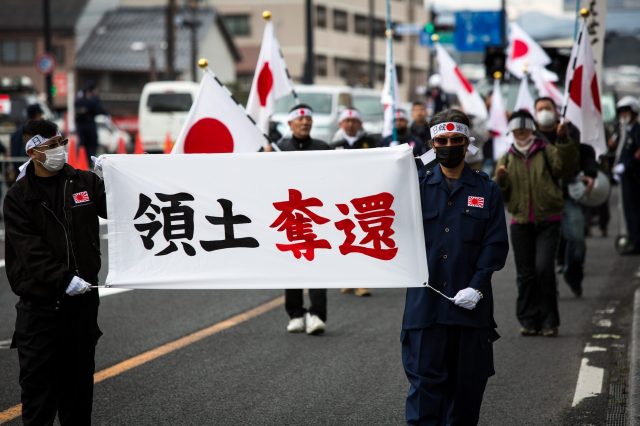Credit: NurPhoto/SIPA USA/PA Images

Conventional politics has been disrupted in too many countries for populism not to be seen as an international phenomenon. And yet there’s very little uniformity. For instance, the most important populist movement may be on the right (as in the Netherlands), or on the left (as in Spain) or spread across the political spectrum (as in Italy).
Another spectrum of difference is the closeness of the populists to power. For instance, they may be firmly in opposition (as in Germany), in a good position to win the next election (as in Britain), a junior partner in a governing coalition (as in Austria), the main party of government (as in Greece) or the dominant party of government (as in Poland).
Perhaps the most interesting development is a non-development – the fact that in some countries there is no populist movement of any significance. One of them – Japan – is the subject of an intriguing piece by Ian Buruma for Project Syndicate:
“Even as a wave of right-wing populism is sweeping Europe, the United States, India, and parts of Southeast Asia, Japan has so far appeared to be immune. There are no Japanese demagogues, like Geert Wilders, Marine Le Pen, Donald Trump, Narendra Modi, or Rodrigo Duterte, who have exploited pent-up resentments against cultural or political elites. Why?”
It’s an excellent question, and Buruma has part of the answer:
“Contemporary Japan may have its flaws, but it is now much more egalitarian than the US, India, or many countries in Europe. High taxes make it hard to pass on inherited wealth. And, unlike in the US, where material prosperity is flaunted, not least by Trump himself, the most affluent Japanese tend to be discreet. Japan has surpassed the US as a country of the middle class.”
There’s a sense of all-embracing inclusion, which is as much cultural as economic:
“…self-worth is defined less by individual fame or wealth than by having a place in a collective enterprise, and doing the job one is assigned as well as one can.”
Buruma is spot on when he says that “resentment feeds off a sense of humiliation, a loss of pride.” In turn, populism feeds off resentment. However, a nation in which almost everyone feels they have a valued (if not equal) part to play, leaves little for the populists to work with.
There are some things that Buruma doesn’t mention. For instance, there’s not a word about Japan’s highly restrictive immigration policy. This has relaxed a little in response to the country’s demographic decline, but there is nothing like the mass immigration that has caused such controversy in Europe and America. For instance, consider Japanese policy on asylum seekers – as explored in a 2016 report by Rupert Wingfield Hayes for the BBC:
“Last year 7,500 people applied for refugee status in Japan but only 27 were approved.
“In Germany and Canada around 40% of asylum applications are approved, in Britain more than 30 per cent. But in Japan the number is 0.2 per cent.”
Then there’s the Japanese approach to law and order. Japan is famous for its very low rates of crime – and especially violent crime. The other side of this equation is a shockingly strict (some might say brutal) criminal justice system. For instance, the courts have a conviction rate of over 99%. Japan’s prisons aren’t much fun either. Here’s one account, from the Gaijinass blog:
“‘Minor’ solitary confinement, the most often assigned punishment, would mean being put into a small room and instructed to sit. Some reports say you must sit in seiza [a kneeling posture], others a cross-legged style. From 0700-1700 this is the assigned position. You do not read or write or hear music. You just sit. You are not permitted to stand up, stretch or walk around the small cell. Toilet use is scheduled.”
If you’re wondering what ‘major’ solitary confinement is, it’s like the ‘minor’ variety only without lights or bedding.
Oh, and the death penalty is still in use.
Japan has a protected economy, a strictly ordered society and a homogenous culture: in other words, it already is what populists elsewhere would like their own countries to become.
***
8PM UPDATE










Join the discussion
Join like minded readers that support our journalism by becoming a paid subscriber
To join the discussion in the comments, become a paid subscriber.
Join like minded readers that support our journalism, read unlimited articles and enjoy other subscriber-only benefits.
Subscribe